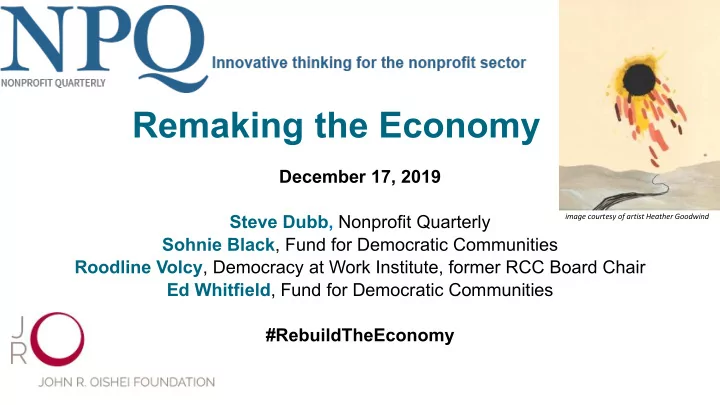

Remaking the Economy December 17, 2019 Steve Dubb, Nonprofit Quarterly image courtesy of artist Heather Goodwind Sohnie Black , Fund for Democratic Communities Roodline Volcy , Democracy at Work Institute, former RCC Board Chair Ed Whitfield , Fund for Democratic Communities #RebuildTheEconomy
Anatomy of a Failed Coop: Lessons from Greensboro’s Renaissance Community Cooperative
Th The e RCC Vi Visio ion • A vehicle for the community to come together to meet their need for fresh, healthy, affordable food • A place where community members would have good jobs • An example of the community’s capacity to do-for-itself
The R e RCC Rea ealit ity Despite: • years of planning, organizing and fundraising • attracting over 1000 owners and support from local government • a well-attended Grand Opening • being the best job many employees said they had ever had … After 2+ years, RCC had to close its doors due to insufficient sales 4
Reasons for r failure? 2 2 C’s a and 3 3 M’s • Corporate Competition • Capacity • Management • Marketing • Movement Building 5
Corporate C e Competition C Cha hallen enges es 1. Proliferation of Dollar Stores 2. Market domination by Walmart and similar retail giants 3. Deeply entrenched shopping habits built around (1) and (2) 6
Capacity C Cha hallen enges es • Difficulty in closing a general skills gap • Difficulty finding General Managers with the hard and soft skills to manage a store in a black, working-class neighborhood 7
Managem emen ent W Woes • Dearth of skilled GMs is an industry-wide problem • GMs must combine understanding of socio-cultural factors common in marginalized communities, and connect these to • staffing and training • product selection • pricing • merchandising • marketing 8
Marketing Fallacies • “If we build it, they will come.” • “This community has no other choice.” • “All this free publicity, we don’t need to market.” Reality We needed a context specific marketing plan and the capacity to execute it – to recapture the market 9
The N Need f for S Stron ong Mov ovement-Building g • RCC was unable to compete solely on price, location, and convenience. • People needed to additional reasons to shop there. We needed to create a movement! 10
How We Lost st O Our M Movement • We began with a broadly held understanding about mutual aid and equity • Unfortunately, when the store opened, we began to act simply as a business. • The spirit of self determination and deep democracy got lost. 11
Lessons L Lear earned ed: Keys t to Sustai ainability • Organize, organize, organize, and never stop o You can build a genuine movement, your competition cannot • Don’t underestimate your competition o Build that awareness into your marketing and movement building • Find and develop skilled management who will keep learning o Support them in acquiring the additional skills they will need • Build in time/opportunity for ongoing training of staff 12
Tell us what you thought! Use Thank y k you ou for j joining us! our special hashtag, #Rebui uildT ldTheEconomy Nonprofit Quarterly relies on your generous support. If you enjoyed this webinar, please consider donating today. For a limited time, the John R. Oishei Foundation will match your gift up to $7,500. Please go to the link below to help us take advantage of this matching campaign! http://bit.ly/2qkhluu image courtesy of artist Heather Goodwind
Recommend
More recommend